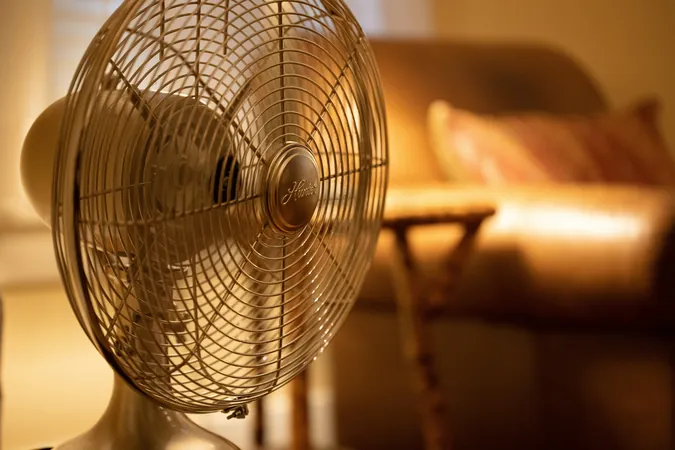
Shocking Find: Electric Fans Fail to Cool Seniors Amidst Deadly Heat Waves!
2024-10-30
Author: Arjun
Groundbreaking Study
In a groundbreaking study published in JAMA, researchers from the University of Ottawa's Human and Environmental Physiology Research Unit have made a startling discovery: electric fans do not lower core body temperatures in seniors during high-temperature events. This revelation comes at a critical time as North America has been facing severe heat waves, leading to alarming increases in heat-related illnesses and fatalities among the elderly.
Heat Wave Crisis
The Pacific Northwest has seen an unusual spike in temperatures, claiming lives in an area where such heat is not typically experienced. Many residents in this region lack air conditioning, leaving them vulnerable during heat waves. Previous studies have indicated that older adults are at a heightened risk for heat-related complications due to a reduced capacity for thermoregulation, largely stemming from decreased sweat production.
Impact of Electric Fans
With this context in mind, officials have often advised seniors without air conditioning to utilize electric fans for relief. However, the recent study sought to rigorously test this guidance. Eighteen volunteers aged between 65 and 72 were subjected to controlled experiments in a climate chamber set to a stifling 36°C (97°F) with a humidity of 45%. Each participant was monitored closely while using various fan settings—off, slow, and fast—to assess any real effects on their core body temperature.
Study Results
The results were eye-opening: neither the slow nor the fast fan settings had any significant impact on lowering the core body temperatures of the participants. While the fast setting created a sensation of coolness, the study revealed a critical danger—this misleading comfort could prevent seniors from recognizing their body's rising internal temperatures, putting them at increased risk of heat-related health issues.
Need for New Strategies
As hot weather persists and experts warn of future climate-related challenges, this study emphasizes an urgent need to rethink cooling strategies for vulnerable populations, particularly in regions unaccustomed to extreme heat. Potential alternatives could include public cooling centers, access to air conditioning, and community outreach programs aimed at educating the elderly on recognizing heat stress symptoms.
Conclusion
Stay informed and protect our elderly loved ones as we face another sizzling summer!


 Brasil (PT)
Brasil (PT)
 Canada (EN)
Canada (EN)
 Chile (ES)
Chile (ES)
 España (ES)
España (ES)
 France (FR)
France (FR)
 Hong Kong (EN)
Hong Kong (EN)
 Italia (IT)
Italia (IT)
 日本 (JA)
日本 (JA)
 Magyarország (HU)
Magyarország (HU)
 Norge (NO)
Norge (NO)
 Polska (PL)
Polska (PL)
 Schweiz (DE)
Schweiz (DE)
 Singapore (EN)
Singapore (EN)
 Sverige (SV)
Sverige (SV)
 Suomi (FI)
Suomi (FI)
 Türkiye (TR)
Türkiye (TR)